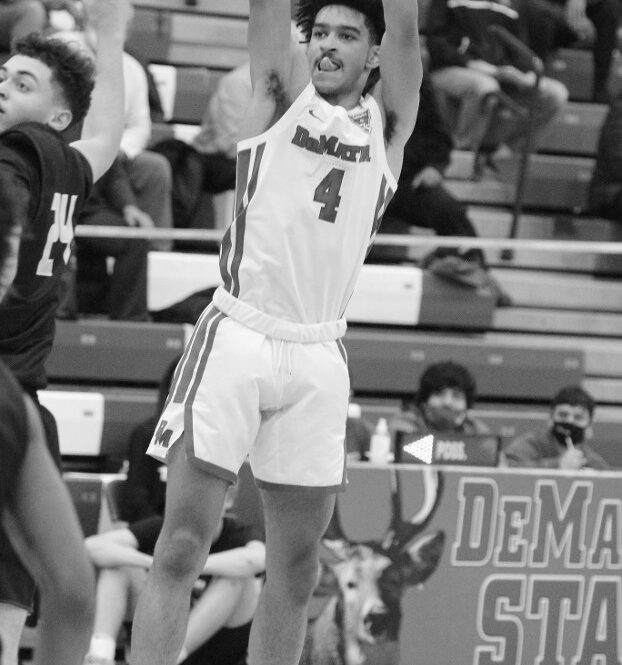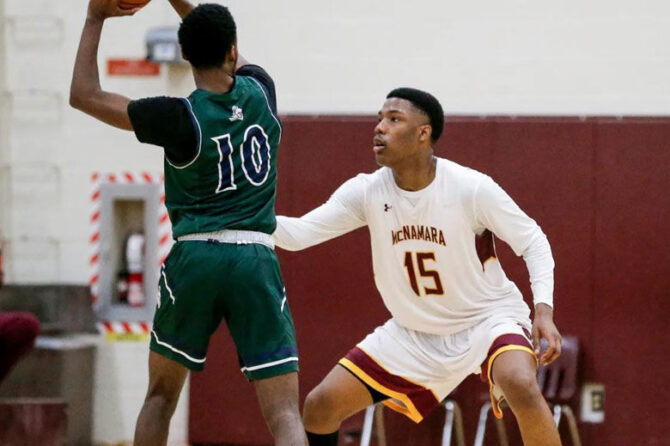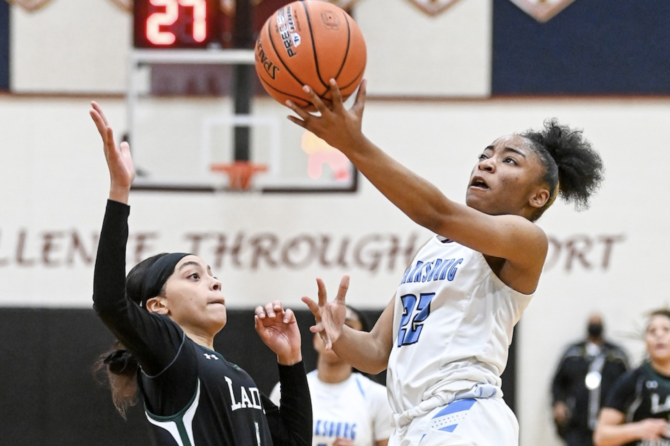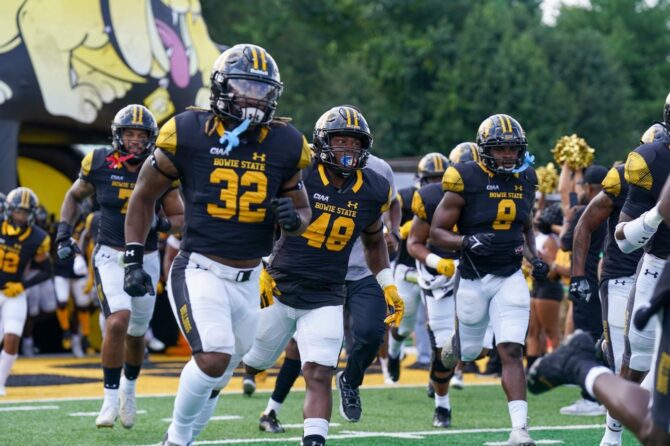In 2021, Rodney Rice was ready to begin his senior year at DeMatha Catholic High School in Hyattsville, Maryland. He was already a star for the powerhouse boys’ basketball team. All signs pointed to Rice having a breakout final season.
About the same time, something radical was happening in youth basketball. A new option for high school players suddenly appeared. A sports media company, Overtime Elite, formed a development program for a few dozen elite players. OTE was doing something unheard of: Paying young players to jump their high school teams and develop their talents as professionals with upstart OTE.
Rice dreamt of playing someday in the National Basketball Association. OTE, with its emphasis on expert coaching and high-level competition, might have been a fast track. It was an opportunity to spend a few seasons in OTE’s program, gaining a high school degree at the same time and get paid for the experience.
OTE offered to pay Rice a total of $600,000, along with a promise of even more in name, image and likeness deals, Rice’s father told Capital News Service. OTE declined to comment, saying the league does not discuss contract negotiations.
“They were talking about how they liked my game, how they can see me playing there, […] and potentially get drafted in a couple years,” Rice said. “It didn’t sound bad at all.”
Shaking up the high school sports hierarchy
Elite high school players like Rice have more options today than ever. Two media companies are shaking up the old order.
The National Interscholastic Basketball Conference is a ten-team super conference of private and parochial schools from Florida to Long Island to Utah. All conference games are carried on ESPN cable channels or streamed on ESPN+.
Overtime is a fledgling media company that attracts huge audiences to social media posts featuring high school players. It formed OTE to capitalize on that audience.
In the end, Rice decided to turn down Overtime Elite and accept an offer to play college basketball at Virginia Tech. He’s now a freshman at the school in Blacksburg, Virginia.
Rice’s decision differs from the choice made by 27 elite high school basketball players who joined Overtime Elite for its first season. One of them was Malik Bowman.
Bowman spent his freshman and sophomore years at Bishop Walsh School, a small Catholic high school in Cumberland, Maryland. His play for the Spartans earned attention from major college programs like the University of Maryland, Georgetown and Ohio State. Bowman opted to skip college, announcing on Twitter in August 2021 that he would be joining OTE’s first-year program.
“I’m just thinking, if I go here, I’m going to be having competition every day to play against,” he said. “And on top of the pro trainers and coaches who played [professionally], I knew I could learn a lot from them.”
Bowman said he was anxious about moving to Atlanta to participate in this new program, but that after his first year, he feels that he made the right choice.
“I was nervous because, of course, OTE is new. It hasn’t gotten anybody to the [NBA] yet,” he said. “Now I would think that I’m more confident in the decision that I made.”
Another option for today’s elite talent is the National Interscholastic Basketball Conference, the league where 6-foot-6 Travis Roberts competed in his senior season in 2021-22 before joining the Jacksonville State men’s basketball team.
Roberts did not seek out the NIBC. The league found him when his school, Bishop Walsh, joined the startup league in 2021, putting itself in the company of elite teams across the country. Still, he expressed gratitude for the one year in the league he was able to get.
“It’s been great playing against a top team in the nation, top players, getting the exposure and you get the best conference in the nation,” Roberts said. “It’s been good for us.”
Choosing the best path; Basketball runs deep in the Rice family.
Rice’s father, also named Rodney, played high school basketball at St. John’s College High School in DC, earning first team All-Met and Washington Post Player of the Year in 1983. He also played collegiate basketball at Boston College University for one year before finishing off his college career at the University of Richmond. Rice’s grandfather played at Fairmont Heights and was All Met in 1960.
OTE first reached out to the latest Rice to carry on the basketball legacy through a youth coach who knew the family, Rodney’s father recalled. The elder Rodney works as a player representative, and he managed business affairs for former NBA star Amare Staudomire.
Talks got serious enough for Rodney’s father to visit OTE’s basketball training headquarters in Atlanta.
Negotiations extended to October, with OTE putting an offer on the table: $600,000 over two years plus $150,000 in NIL opportunities, according to Rodney’s father.
The numbers startled Peter Strickland, Rice’s coach at DeMatha Catholic.
“I remember thinking, ‘My, this world is changing,’” Strickland said. “We are now pursuing high school players […] to make them professionals at a really early age.”
There were good reasons to say yes to OTE, even beyond the obvious financial incentives. In the new developmental program, Rice would have a chance to learn under head coach Kevin Ollie, a former NBA player and former coach of the University of Connecticut men’s basketball team which won a National Collegiate
Athletic Association national championship.
The Rice family also was intrigued by the education program offered by OTE. In addition to basketball training, all players attend classes and work toward their high school degrees.
“Being able to take classes during the season was a bonus, you could start working towards a degree,” Rice’s father said.
There were turnoffs too.
At Overtime Elite, Rice would be a professional and would have forfeited any remaining high school and college eligibility. That would have closed an important door for Rice. His one-time high school coach Mike Jones had left Dematha Catholic in 2021 to become associate head coach at Virginia Tech. Coach and player had developed a close relationship. Virginia Tech was one of a few schools that Rice considered, along with Louisville and Alabama.
In the end, the decision to say no to OTE and yes to Virginia Tech happened at the family’s breakfast table.
“It was me, Rodney’s mom and himself, and we were kind of going over the pros and cons,” Rodney’s father said.
“My dad told me, at the end of the day, I make my own decisions. But I want everyone else to feel comfortable too, especially if it’s my family,” Rice said. Rice’s sister also joined him as a student at Virginia Tech.
“I made my decision based on my social life, being around people my age and people that don’t play basketball,” Rice said.
This basketball season, watch out for Rice in his maroon and orange Hokies uniform. He’ll be wearing No. 1.










